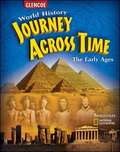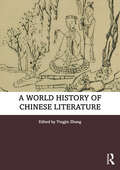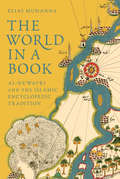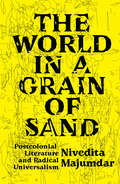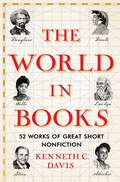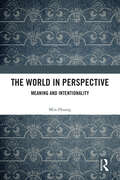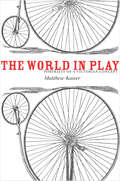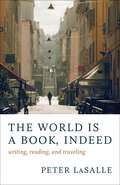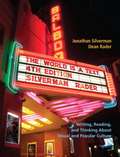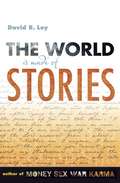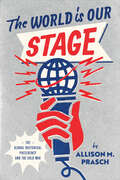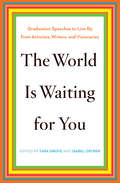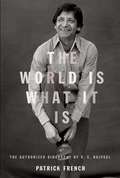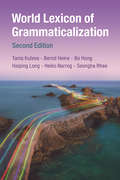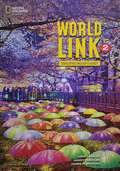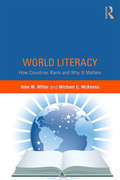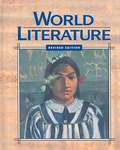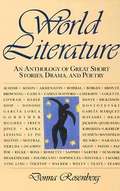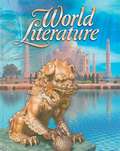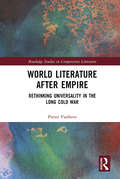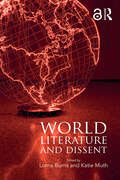- Table View
- List View
World History: Journey Across Time, The Early Ages
by Jackson J. SpielvogelJourney Across Time: The Early Ages is an all-new middle school world history program organized chronologically from the first humans and ancient civilizations to the present. Co-authored by National Geographic and Jackson Spielvogel, Journey Across Times: The Early Ages' engaging narrative and outstanding visuals transport students back in time. As co-author, National Geographic ensures that students understand the influence of geography on historical events. The result is a standards-based program with important geography skills embedded in every lesson. Journey Across Time: The Early Ages is available in a full volume and also as Course 1 (7000 B.C. to A.D. 800) and Course 2 (A.D. 500 to A.D. 1750).
A World History of Chinese Literature
by Yingjin ZhangProviding a broad introduction to the area, A World History of Chinese Literature maps the field of Chinese literature across its various worlds, looking both within – at the world of Chinese literature, its history, linguistic, cultural, local, and regional specificities – and without – at the way Chinese literature has circulated throughout the world. The thematic focus allows for a broad number of key categories, such as authors, genres, genders, regions, as well as innovative explorations of new topics and issues such as inter-arts performativity and transmediation. The sections cover the circulation and reception of China in world literature, as well as the worlds of: Chinese literature across the globe Borders, oceans, and rainforests Comparative literary genres Translingual writers and scholars Gender configurations Translation and transmediation With a focus on the twentieth and twenty-first century, this collection intervenes in current debates on global Chinese literature, Sinophone and Sinoscript studies, and the production and reception of literary works by ethnic Chinese in non-Sinitic languages, as well as Anglophone literature inspired by Chinese literary tradition. It will be of interest to anyone working on or studying Chinese literature, language and culture, as well as world literatures in relation to China.
The World in a Book: Al-Nuwayri and the Islamic Encyclopedic Tradition
by Elias MuhannaShihab al-Din al-Nuwayri was a fourteenth-century Egyptian polymath and the author of one of the greatest encyclopedias of the medieval Islamic world—a thirty-one-volume work entitled The Ultimate Ambition in the Arts of Erudition. A storehouse of knowledge, this enormous book brought together materials on nearly every conceivable subject, from cosmology, zoology, and botany to philosophy, poetry, ethics, statecraft, and history. Composed in Cairo during the golden age of Islamic encyclopedic activity, the Ultimate Ambition was one of hundreds of large-scale compendia, literary anthologies, dictionaries, and chronicles produced at this time—an effort that was instrumental in organizing the archive of medieval Islamic thought.In the first study of this landmark work in a European language, Elias Muhanna explores its structure and contents, sources and influences, and reception and impact in the Islamic world and Europe. He sheds new light on the rise of encyclopedic literature in the learned cities of the Mamluk Empire and situates this intellectual movement alongside other encyclopedic traditions in the ancient, medieval, Renaissance, and Enlightenment periods. He also uncovers al-Nuwayri’s world: a scene of bustling colleges, imperial chanceries, crowded libraries, and religious politics.Based on award-winning scholarship, The World in a Book opens up new areas in the comparative study of encyclopedic production and the transmission of knowledge.
The World in a Grain of Sand: Postcolonial Literature and Radical Universalism
by Nivedita MajumdarRadical universalism vs postcolonial theoryThe World in a Grain of Sand offers a framework for reading literature from the global South that goes against the grain of dominant theories in cultural studies, especially, postcolonial theory. It critiques the valorization of the local in cultural theories typically accompanied by a rejection of universal categories - viewed as Eurocentric projections. But the privileging of the local usually amounts to an exercise in exoticization of the South. The book argues that the rejection of Eurocentric theories can be complemented by embracing another, richer and non-parochial form of universalism. Through readings of texts from India, Sri Lanka, Palestine and Egypt, the book shows that the fine grained engagement with culture, the mapping of ordinary lives not just as objects but subjects of their history, is embedded in much of postcolonial literature in a radical universalism - one that is rooted in local realities, but is able to unearth in them the needs, conflicts and desires that stretch across cultures and time. It is a universalism recognized by Marx and steeped in the spirit of anti-colonialism, but hostile to any whiff of exoticism.
The World in Books: 52 Works of Great Short Nonfiction (Great Short Books)
by Kenneth C. DavisA delightful, inspiring, and idea-rich selection of fifty-two of the best, most important short nonfiction works of all time—from Plato to Michael Pollan and Dante to Joan Didion—chosen by historian, lifelong reader, and bestselling author of Don&’t Know Much About History.From ancient times to the present day, The World in Books offers a wide-ranging historical education through pleasure reading—and a fantastic introduction to some of the most thought-provoking, profound, and interesting nonfiction works of all time. From Sun Tzu&’s The Art of War to bell hooks&’s All About Love, as well as such recent classics as Barbara Ehrenreich&’s Nickel and Dimed and Chimamanda Ngozi Adichie&’s We Should All Be Feminists, Davis&’s guide suggests a world of nonfiction books and explains just why they&’re so historically meaningful and culturally relevant today. The perfect guide for the modern-day reader, these fifty-two selections provide an ideal way to explore some of the most enduring, influential books ever published, introducing us anew to world-shaping historical figures, events, and ideas.
The World in Perspective: Meaning and Intentionality
by Min HuangThis book aims to reclaim the significance of meaning within the philosophical thinking that has evolved from Descartes and Locke through Kant, Husserl, and Frege, focusing on intentionality—the mind's directedness toward the reality.The author opens with an epistemological account of analyticity and illustrates the central role of intentionality within it. A transcendentalist view on intentionality is then adopted, in contrast with the prevalent naturalist stance. Addressing key themes in the philosophy of language—truth, representation, propositions, predication, reference, and sense— the book presents a framework for a meaning–intentionality theory, which integrates key insights from Frege, Husserl, Wittgenstein, Dummett, and Davidson.The book will appeal to scholars and graduate students of epistemology, philosophy of language, philosophy of mind, theory of meaning, and theory of intentionality.
The World in Play: Portraits of a Victorian Concept
by Matthew KaiserNineteenth-century Britain was a world in play. The Victorians invented the weekend and built hundreds of parks and playgrounds. In the wake of Darwin, they re-imagined nature as a contest for survival. The playful child became a symbol of the future. A world in play means two things: a world in flux and a world trapped, like Alice in Wonderland, in a ludic microcosm of itself. The book explores the extent to which play (competition, leisure, mischief, luck, festivity, imagination) pervades nineteenth-century literature and culture and forms the foundations of the modern self. Play made the Victorian world cohere and betrayed the illusoriness of that coherence. This is the paradox of modernity. Kaiser gives an account of how certain Victorian misfits—working-class melodramatists of the 1830s, the reclusive Emily Brontë, free spirits Robert Louis Stevenson and John Muir, mischievous Oscar Wilde—struggled to make sense of this new world. In so doing, they discovered the art of modern life.
The World Is a Book, Indeed: Writing, Reading, and Traveling
by Peter LaSalleThe World Is a Book, Indeed chronicles in eleven rich personal essays the ongoing quest of award-winning writer Peter LaSalle to embark on offbeat, often startlingly revelatory literary travel. LaSalle spends a summer roaming the lesser-known quarters of Paris, haunted by the writing of the French surrealists. In Hanoi, he meets for beers with the editors—two military men—of the Army Literature and Arts Magazine while investigating Vietnam’s acknowledged great modern novel, Bao Ninh’s The Sorrow of War. Other pieces find LaSalle on a strange nighttime drive through the streets of sprawling São Paulo in search of landmarks associated with Brazilian modernist poetry, bouncing around Africa to interview writers there when very young, exploring Argentine author Jorge Luis Borges's memorable stay in Texas, and traveling to Istanbul, Lisbon, Tunis, and elsewhere, as he considers major writers amid the settings that produced their works. Deeply felt and replete with insight into literature and life itself, even capable of evoking valid mind leaps in its innovative approaches, this is a collection for readers who love books and want to learn more about the places they originated, presented by a well-traveled guide with an intimate voice and a gift for the essay form.
The World is a Text: Writing, Reading, and Thinking about Visual and Popular Culture (Fourth Edition)
by Jonathan Silverman Dean RaderThis illustrated cultural studies reader directly engages the process of reading and writing about the “texts” one sees in everyday life. Using the lenses of rhetoric, semiotics and cultural studies, students are encouraged to become effective academic writers while gaining deeper insights into such popular culture categories as movies, technology, race, music, ethnicity, television, media, public space, and more.
The World Is Made of Stories
by David R. LoyIn this dynamic and utterly novel presentation, David Loy explores the fascinating proposition that the stories we tell--about what is and is not possible, about ourselves, about right and wrong, life and death, about the world and everything in it--become the very building blocks of our experience and of reality itself. Loy uses an intriguing mixture of quotations from familiar and less-familiar sources and brief stand-alone micro-essays, engaging the reader in challenging and illuminating dialogue. As we come to see that the world is made--in a word--of stories, we come to a richer understanding of that most elusive of Buddhist ideas: shunyata, the "generative emptiness" that is the all-pervading quality inherent to all mental and physical forms in our ever-changing world. Reminiscent of Zen koans and works of sophisticated poetry, this book will reward both a casual read and deep reflection.
The World Is Our Stage: The Global Rhetorical Presidency and the Cold War
by Allison M. PraschA fresh account of the US presidential rhetoric embodied in Cold War international travel. Crowds swarm when US presidents travel abroad, though many never hear their voices. The presidential body, moving from one secured location to another, communicates as much or more to these audiences than the texts of their speeches. In The World is Our Stage, Allison M. Prasch considers how presidential appearances overseas broadcast American superiority during the Cold War. Drawing on extensive archival research, Prasch examines five foundational moments in the development of what she calls the “global rhetorical presidency:” Truman at Potsdam, Eisenhower’s “Goodwill Tours,” Kennedy in West Berlin, Nixon in the People’s Republic of China, and Reagan in Normandy. In each case, Prasch reveals how the president’s physical presence defined the boundaries of the “Free World” and elevated the United States as the central actor in Cold War geopolitics.
The World Is Our Stage: The Global Rhetorical Presidency and the Cold War
by Allison M. PraschA fresh account of the US presidential rhetoric embodied in Cold War international travel. Crowds swarm when US presidents travel abroad, though many never hear their voices. The presidential body, moving from one secured location to another, communicates as much or more to these audiences than the texts of their speeches. In The World is Our Stage, Allison M. Prasch considers how presidential appearances overseas broadcast American superiority during the Cold War. Drawing on extensive archival research, Prasch examines five foundational moments in the development of what she calls the “global rhetorical presidency:” Truman at Potsdam, Eisenhower’s “Goodwill Tours,” Kennedy in West Berlin, Nixon in the People’s Republic of China, and Reagan in Normandy. In each case, Prasch reveals how the president’s physical presence defined the boundaries of the “Free World” and elevated the United States as the central actor in Cold War geopolitics.
The World Is Our Stage: The Global Rhetorical Presidency and the Cold War
by Allison M. PraschA fresh account of the US presidential rhetoric embodied in Cold War international travel. Crowds swarm when US presidents travel abroad, though many never hear their voices. The presidential body, moving from one secured location to another, communicates as much or more to these audiences than the texts of their speeches. In The World is Our Stage, Allison M. Prasch considers how presidential appearances overseas broadcast American superiority during the Cold War. Drawing on extensive archival research, Prasch examines five foundational moments in the development of what she calls the “global rhetorical presidency:” Truman at Potsdam, Eisenhower’s “Goodwill Tours,” Kennedy in West Berlin, Nixon in the People’s Republic of China, and Reagan in Normandy. In each case, Prasch reveals how the president’s physical presence defined the boundaries of the “Free World” and elevated the United States as the central actor in Cold War geopolitics.
The World Is Waiting for You: Graduation Speeches to Live By from Activists, Writers, and Visionaries
by Edited by Tara Grove and Isabel OstrerInspiring commencement speeches from Wynton Marsalis, Toni Morrison, Gloria Steinem, and others: &“The perfect gift for grads-to-be&” (O, The Oprah Magazine). &“The voices of conformity speak so loudly. Don&’t listen to them,&” acclaimed author and award-winning journalist Anna Quindlen cautioned graduates of Grinnell College. Jazz virtuoso and educator Wynton Marsalis advised new Connecticut College alums not to worry about being on time, but rather to be in time—because &“time is actually your friend. He don&’t come back because he never goes away.&” And renowned physician and humanitarian Paul Farmer revealed at the University of Delaware his remarkable discovery—the new disease Empathy Deficit Disorder—and assured the commencers it could be cured. The prescient, fiery feminism of Gloria Steinem sits parallel to that of celebrated writer Ursula K. Le Guin, who asks, &“What if I talked like a woman right here in public?&” Nobel Prize–winning author Toni Morrison sagaciously ponders how people centuries from now will perceive our current times, and Pulitzer Prize–winning author Barbara Kingsolver asks those born into the Age of Irony to &“imagine getting caught with your Optimism hanging out&” and implores us always to act and speak the truth. With eighteen rousing graduation speeches, The World Is Waiting for You speaks to anyone who might take to heart the advice of Planned Parenthood president Cecile Richards—&“life as an activist, troublemaker, or agitator is a tremendous option and one I highly recommend&”—and is the perfect gift for all who are ready to move their tassels to the left.
The World Is What It Is: The Authorized Biography of V. S. Naipaul
by Patrick FrenchV.S. Naipaul's biographer aims not to sit in judgment of the Nobel laureate, but to expose the subject with ruthless clarity to the calm eye of the reader. In this he succeeds admirably. Descendant of poor Brahmins, born in 1932 in Trinidad and educated in Oxford, Naipaul is haunted by matters of race, colonialism and sex. He is, says award-winning author French (Younghusband), both the racist (against those darker than he) and the victim of racial prejudice, tendencies that come through in his novels and in his treatment of friends and lovers. Haunting this biography are Naipaul's women. His wife, Pat, supported him, overlooked his affairs and his visits with prostitutes, and subordinated herself to his genius; Naipaul gave equally little to Margaret, his mistress.
World Lexicon of Grammaticalization
by Tania Kuteva Bernd Heine Bo Hong Haiping Long Heiko Narrog Seongha RheeExtensively revised and updated, this second edition provides, in an A-Z format, an analysis of the most important generalizations that have been made on the unidirectional change of grammatical forms and constructions. Based on the analysis of more than 1,000 languages, it reconstructs over 500 processes of grammatical change in the languages of the world, including East Asian languages such as Chinese, Korean and Japanese. Readers are provided with the tools to discover how lexical and grammatical meanings can be related to one another in a principled way, how such issues as polysemy, heterosemy, and transcategoriality are dealt with, and why certain linguistic forms have simultaneous lexical and grammatical functions. Definitions of lexical concepts are provided with examples from a broad variety of languages, and references to key relevant research literature. Linguists and other scholars will gain a better understanding of languages on a worldwide scale.
World Link 2
by Nancy Douglas John Hughes James R. MorganWorld Link, Fourth Edition teaches learners to communicate confidently. It develops integrated language skills with an emphasis on spoken English through familiar topics, relevant grammar, and essential vocabulary. World Link brings the world to the classroom through a famously fun video program, relatable National Geographic content, and teacher-tested lessons.
World Literacy: How Countries Rank and Why It Matters
by Michael C. McKenna John W. MillerInternational literacy assessments have provided ample data for ranking nations, charting growth, and casting blame. Summarizing the findings of these assessments, which afford a useful vantage from which to view world literacy as it evolves, this book examines literate behavior worldwide, in terms of both the ability of populations from a wide variety of nations to read and the practice of literate behavior in those nations. Drawing on The World’s Most Literate Nations, author Jack Miller’s internationally released study, emerging trends in world literacy and their relationships to political, economic, and social factors are explored. Literacy, and in particular the practice of literate behaviors, is used as a lens through which to view countries’ economic development, gender equality, resource utilization, and ethnic discrimination. Above all, this book is about trajectories. It begins with historical contexts, described in terms of support for literate cultures. Based on a variety of data sources, these trends are traced to the present and then projected ahead. The literate futures of nations are discussed and how these relate to their economic and sociocultural development. This book is unique in providing a broader perspective on an intractable problem, a vantage point that offers useful insights to inform policy, and in bringing together an array of relevant data sources not typically associated with literacy status.
World Literature
by Susan Wittig Albert Richard Cohen Rose Sallberg Kam David Adams Leeming Thomas Monsell Carroll MoultonWorld Literature textbook for high school
World Literature: An Anthology of Great Short Stories, Drama, and Poetry
by Donna Rosenberg Mcgraw-Hill StaffAn exciting anthology of thought provoking short stories, plays & poems, written by major authors from all over the world, translated to English. Seven geographical areas are covered. The selections span from the 13th Century BC to the late 20th Century AD. Each selection includes critical & biographical information, questions which emphasize inferential thinking, expository & creative writing assignments & a glossary of literary terms.
World Literature (3rd Edition)
by Jan AndersonWorld Literature introduces students to the wonderful variety of classic literature produced through the centuries. The first ten units showcase a medley of writing styles that illustrate various literary devices or themes. The last six units present literature by region and era. This breakdown helps the student to gain a full understanding of literature's variety, beauty, and history.
World Literature (3rd Edition)
by Holt Rinehart WinstonThe textbook contains World Myths and Folktales, The African Literary Tradition, The ancient Middle East, The Literature of Ancient Mesopotamia, Greek and Roman Literatures, Indian Literature, Chinese and Japanese Literatures, Persian and Arabic Literatures, The Middle Ages, From the Renaissance to the Enlightenment, The nineteenth Century: Romanticism to Realism, Modern and Contemporary World Literature, and a lot more.
World Literature After Empire: Rethinking Universality in the Long Cold War (Routledge Studies in Comparative Literature)
by Pieter VanhoveThis book makes the case that the idea of a "world" in the cultural and philosophical sense is not an exclusively Western phenomenon. During the Cold War and in the wake of decolonization a plethora of historical attempts were made to reinvent the notions of world literature, world art, and philosophical universality from an anticolonial perspective. Contributing to recent debates on world literature, the postcolonial, and translatability, the book presents a series of interdisciplinary and multilingual case studies spanning Europe, the United States, and China. The case studies illustrate how individual anti-imperialist writers and artists set out to remake the conception of the world in their own image by offering a different perspective centered on questions of race, gender, sexuality, global inequality, and class. The book also discusses how international cultural organizations like the Afro-Asian Writers’ Bureau, UNESCO, and PEN International attempted to shape this debate across Cold War divides.
World Literature and Dissent
by Lorna Burns Katie MuthWorld Literature and Dissent reconsiders the role of dissent in contemporary global literature. Bringing together scholars of world and postcolonial literatures, the contributors explore the aesthetics of resistance through concepts including the epistemology of ignorance, the rhetoric of innocence, the subversion of paying attention, and the radical potential of everydayness. Addressing a broad range of examples, from the Maghrebian humanist Ibn Khaldūn to India’s Facebook poets and examining writers such as Langston Hughes, Ben Okri, Sara Uribe, and Merle Collins, this highly relevant book reframes the field of world literature in relation to dissenting politics and aesthetic. It asks the urgent question: how critical practice might cultivate radical thought, further social justice, and value human expression?
